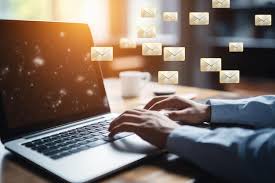
In the competitive freelance landscape, mastering email communication is essential for securing long-term clients. Unlike social media or instant messaging, emails offer a more personal touch that fosters trust and builds lasting relationships. To get started, freelancers should focus on crafting initial outreach emails that emphasize personalization and clarity. A well-written email can make a powerful first impression, showcasing your understanding of a client’s needs and positioning you as the solution they’ve been looking for. Strong subject lines that pique interest and engaging content can significantly increase open rates and set the stage for meaningful connections.
Once you’ve established initial contact, the key to turning one-off clients into long-term partners lies in effective follow-up strategies. This involves creating email sequences that nurture relationships without overwhelming clients. Regular check-ins, personalized updates, and value-driven content keep your services top-of-mind and reinforce your commitment to their success. By leveraging feedback from these communications, freelancers can continually refine their offerings, ensuring they meet evolving client needs. Ultimately, viewing email as a bridge to building lasting business partnerships can transform casual clients into loyal advocates, leading to sustainable growth and greater financial stability.
Research and Target Potential Clients
When researching and targeting potential clients, it’s crucial for freelancers to focus on businesses that align with their skills and values.
Identify ideal clients: Look for businesses with a history of long-term freelance engagements, as they understand the freelance dynamic and are more likely to establish stable, ongoing relationships.
- This not only provides job security but also allows freelancers to offer more tailored, effective solutions.
Experienced freelancers often find that these clients lead to higher satisfaction, while newbies can avoid clients who frequently switch freelancers, offering a more stable start.
Personalizing your outreach is another game-changer.
Tailor each email to address the client’s specific challenges, showing how your expertise can provide solutions.
- Research your potential client: Understand their business, their pain points, and how your skills can help.
- Clients appreciate communication that feels human, not robotic.
By demonstrating that you genuinely care about their needs, you’ll build trust, whether you’re a newbie or an experienced freelancer, and significantly increase your chances of landing long-term projects.
Craft Compelling Subject Lines
Crafting compelling subject lines is a powerful tool for freelancers looking to stand out in a crowded inbox. The key is to grab attention by highlighting a solution to a problem the client is facing. For example, a subject line like “Increase Your Email Engagement with Targeted Campaigns” addresses a pain point many businesses face—low engagement—and shows you’re ready to help solve it. Whether you’re new to freelancing or have years of experience, clients appreciate it when emails feel relevant and provide immediate value, increasing the chances they’ll actually open and read your message.
Sharing your relevant experience in the subject line adds credibility right away. Clients want to know you’ve worked with businesses like theirs. For instance, “Helping E-commerce Brands Boost Conversions” signals that you’ve got the skills to tackle their specific needs. As a freelancer, mentioning your industry-specific work helps build trust from the get-go. It assures the client that you’re not just another random pitch in their inbox but someone who understands their challenges and has practical solutions to offer based on real-world experience.
Finally, express genuine interest by referencing something specific about their business in the subject line. A subject like “Excited to Help [Company Name] Expand its Reach with Better Emails” shows that you’ve done your research and are truly interested in working with them. This personal touch resonates with clients, whether you’re new to freelancing or an experienced professional. It makes your outreach more human and relatable, helping you form authentic connections that are key to building long-term freelance relationships.
Propose Solutions, Not Just Services
When reaching out to potential clients, it’s essential for freelancers to propose solutions rather than just listing their services. Here are some key points to consider:
- Address client needs: Clients don’t want a generic rundown of what you offer; they want to know how you can solve their specific problems or improve their operations.
- For example, instead of saying “I offer email marketing services,” try “I can help streamline your email campaigns to increase engagement and drive conversions.”
- This approach shows that you’ve considered their unique needs and are focused on providing value, not just selling a service.
- Engage both newbies and experienced freelancers: Stand out by directly addressing the client’s pain points and offering tailored solutions.
Another effective strategy is to provide insights that go beyond the immediate project:
- Share valuable resources: Offering relevant articles, industry reports, or personalized advice demonstrates your expertise and willingness to assist long-term.
- If you’ve worked with similar clients, mention trends in their industry or offer actionable insights to make your emails more valuable.
- Build trust: Clients appreciate freelancers who understand their business and proactively provide meaningful suggestions.
- This level of engagement not only builds trust but also positions you as a partner rather than just a service provider.
Follow Up Strategically

Following up strategically can significantly enhance your chances of securing freelance opportunities. If you haven’t heard back from a potential client in a week or two, sending a polite follow-up email is a crucial step. This simple gesture not only shows your continued interest but also demonstrates professionalism and initiative. Many freelancers face the disappointment of being left in the dark after their initial outreach, but a well-timed check-in can remind clients of your proposal and keep the conversation alive. You might say something like, “I wanted to check in and see if you had any questions about my previous email. I’m really excited about the possibility of working together!” This approach can help you stand out in a crowded inbox.
Moreover, your follow-up email should express genuine concern for the client’s needs. Acknowledge their busy schedule and the demands they face, which often leads to delayed responses. By recognizing that their time is valuable, you build rapport and make your outreach more relatable. Consider adding a personal touch, perhaps referencing a recent project or initiative they’ve undertaken, to show that you’ve done your homework. This not only reinforces your interest but also positions you as someone who truly understands their business. For both newbies and seasoned freelancers, thoughtful follow-ups can turn a missed opportunity into a fruitful collaboration.
Maintain Professionalism and Reliability
- Consistent communication is vital for freelancers aiming to build strong relationships with their clients.
- Keeping clients informed about project progress demonstrates professionalism and helps build trust.
- Regular updates via emails reassure clients that their project is on track, making them feel valued and engaged.
- If concerns arise, promptly addressing them shows that you care about their needs and are committed to delivering results.
- This level of attentiveness can make a world of difference, especially for freelancers new to the field who might feel overwhelmed by managing client expectations.
Delivering quality work is equally important in fostering long-term relationships.
- Clients are more likely to return for future projects or recommend you to others when they see consistent, high-quality results.
- For freelancers, this means prioritizing attention to detail and dedicating time to perfecting your craft.
- Whether it’s crafting compelling copy, designing eye-catching graphics, or developing a seamless website, your work reflects your brand.
- By making quality your hallmark, you encourage repeat business and create a solid foundation of trust and reliability that clients can count on, whether they’re seasoned pros or just starting in freelancing.
Bottom line
Finally, leveraging email as a strategic tool for securing long-term clients is essential for freelancers looking to thrive in a competitive marketplace. By focusing on personalized outreach, nurturing relationships through thoughtful follow-ups, and consistently providing value, freelancers can transform one-time projects into lasting partnerships. This approach not only enhances client retention but also fosters trust and loyalty, ultimately leading to a more sustainable and profitable freelance career. Embracing the power of email communication can set you apart, making it a true secret weapon in your freelance arsenal.

